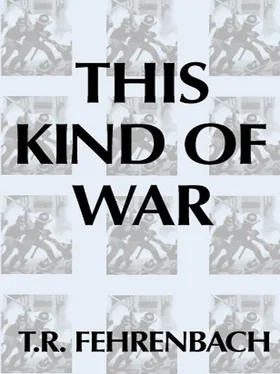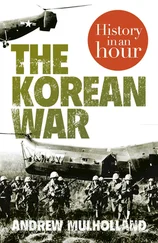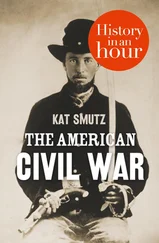During the last years of Napoleon's reign, his ministers calculated that the French nation could afford 100,000 casualties per month in the emperor's wars. The figures were based on the total French population, and the number of men coming of military age each year. What was not taken into account was that the French people, having left the bones of two million men from Lisbon to Moscow, were becoming completely unenthusiastic about stepping "into the breach" however valid the reasons.
Professional soldiers have been and may be used as pawns on the table of diplomacy. Impressed American citizens may not, without vast consequences. In November 1952, General Eisenhower carried the election by a landslide.
On 21 November General Clark in Tokyo received word that the President-elect was flying to Korea in early December, and wanted no receptions, diplomatic teas, and the like. He would make a tour of the front, which presented Clark with an enormous security problem. Eisenhower's movements in a hostile theater had to be kept secret as far as possible, and he must never be permitted to come within each of enemy guns.
The news of the President-elect's coming had a palpable effect on the men engaged in Korea. Ranking general and private alike, many of these men had been haunted by the sense of being forgotten. It had seemed to them that the United States was slowly adjusting to a situation in which Eighth Army held the far-off battle line forever, while life in the homeland went on as before. While public opinion was hostile to the war, there was also evidence that many people preferred to put the unpleasantness out of mind.
There was now very little of the hero's welcome for returnees of the Korean War. The American people did not quite know how to regard a war they had not won.
With news of Eisenhower's coming, generals began to speculate if soon they might be released from the restrictions that bound them to stalemate, while privates wondered if it meant they might soon go home.
Clark, who in company with most of FECOM generaldom, had felt deeply the same frustration as MacArthur, had prepared a detailed list of forces needed and planning required to achieve military victory in Korea. Clark was particularly sanguine about employing Chiang Kai-shek's idle and aging divisions on Taiwan—which had not been used primarily because of European repugnance to the idea.
Eisenhower flew into Suwon early in December 1952, bringing with him a large entourage—Charles E. Wilson, the Secretary of Defense Designate; General Omar Bradley, Chairman of the JCS; Admiral Radford, COMINPAC; Generals Ramey and Persons, Herbert Brownell, and his press secretary, Jim Hagerty.
He made a whirlwind tour of the areas in back of the battlefront, and met briefly with Syngman Rhee. He discussed very little business, and in that sense his trip seemed what his political opponents claimed—a cheap gesture, to pay off a campaign promise in even cheaper coin. But from this visit two highly significant facts stood forth.
Ike never saw Clark's list of requirements for winning the war. The matter was not even broached, and it was immediately apparent to Clark that the new Administration intended to press for an honorable peace rather than to broaden the fighting. In this sense, Eisenhower's trip seemed to solve nothing, accomplish nothing, except to inform the generals that there would be no immediate change of policy.
The other significant matter that was discussed lay buried under a cloak of security. For two years the enemy had battered the U.N. with a propaganda war, while the U.N. attempts to strike back had been somewhat fumbling. Now Eisenhower showed himself keenly interested in psychological warfare as it was being waged from Japan. For two years and more, the U.N. Command had shouted its every intention to the world—and to the enemy; now this was to change.
Eisenhower, and the men around him, rightly or wrongly, were of the opinion that the Soviet Union wanted no big war, and it was time for the United States to take a certain amount of initiative—to keep the other side off balance, if possible. This tactic had been discussed before, and always discarded as too dangerous. Consequently, the policy had been always to tell the Communists exactly where the United States stood, while the Communists said nothing of their own intentions.
The new Administration was determined to step up the psychological pressures that could be applied to the enemy. The Communist world had many vulnerable areas. Some of these, like the captive European peoples, the Administration would find too sensitive; the United States could meddle behind the iron curtain only at the certain risk of war.
But there were other areas, such as the situation in Korea, that might be exploited. Now, certain measures were planned that would have an important bearing on the ending of the war.
While in Korea, Eisenhower was briefed by Clark on the reported ammunition shortage, which had become a major scandal in the American press. It was true that certain calibers of artillery and mortar ammunition were in short supply, and Clark had rationed them. But the line itself had never been hampered.
Part of the shortage was real. Rear-area ammunition dumps had been depleted by the unprecedented expenditure along the line; in the commendable effort to save lives American artillery had taken to hurling enormous quantities of metal during the hill battles. The barrages fired exceeded anything in either of the two world wars, and by 1953 more shells had already been fired during the limited war in Korea than in all of World War II. While the enemy had an estimated number of field guns equal to those of the U.N., it was the American volume of fire, hurled without stint or counting, and its superior placement, that enabled the U.N. to win almost all the hill battles from Heartbreak to Pork Chop.
The rest of the shortage lay in mismanagement by FECOM ordnance. A new ordnance officer was installed; accounting methods were improved; shipments from the States speeded up, and front-line troops ordered not to discuss any restrictions with reporters—and the question of the ammunition shortage died a natural death, while some divisions went on burning up as many as ten thousand rounds per night.
The briefings and discussions ended, Ike flew home; Christmas came. The war went on as before, and the expectations of troops and generals dulled.
But everywhere new pressures were mounting, and events were marching toward conclusions.
While hills along the uneasy battle line were disputed, now in the eastern mountains, now in the Marine zone near the estuary of the Imjin on the west, the American people's impatience with the war was matched in other places. And the impatience was colored by rising fear, for the longer the guns in Korea exploded, the greater the danger of a bigger conflict. The smaller countries of the U.N. had never ceased to explore ways out of the prisoner-of-war deadlock.
It was a difficult task. Steadfastly, the United States refused to order men to return to tyranny at gunpoint; here the moral issue was clear-cut. And just as adamantly, the Red Chinese and North Koreans declined to accept anything less than full repatriation.
This was the only deadlock preventing truce. The other questions, such as unification of Korea, and guarantees of its independence, the U.N. had put by the board in its resolution of February 1951, when it was decided that these problems were to be solved "through peaceful means" at a conveniently unspecified time following cease-fire.
At first, owing to the extravagant claims of Nam II and the Communist leadership at Panmunjom, world opinion had remained confused on the POW issue. Among the neutrals, particularly, there had been much doubt that the United States told the truth, that there had been no coercion used on the POW's at the time the prisoners were rioting by the thousands on Koje. If a mass breakout had occurred, the United States would never have been able to convince these peoples of its truthfulness and morality.
Читать дальше












